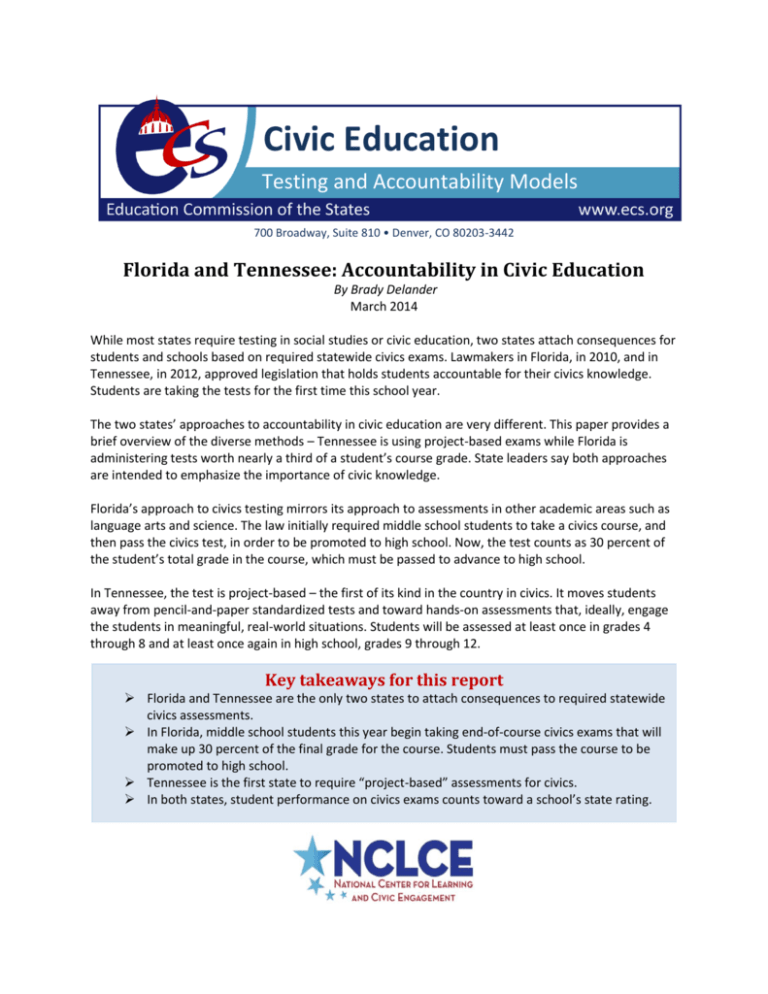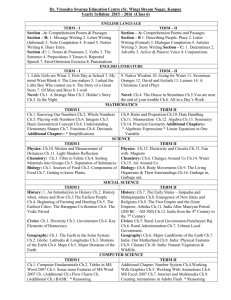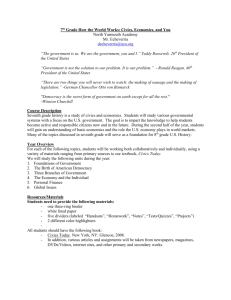
Civic Education
Testing and Accountability Models
700 Broadway, Suite 810 • Denver, CO 80203-3442
Florida and Tennessee: Accountability in Civic Education
By Brady Delander
March 2014
While most states require testing in social studies or civic education, two states attach consequences for
students and schools based on required statewide civics exams. Lawmakers in Florida, in 2010, and in
Tennessee, in 2012, approved legislation that holds students accountable for their civics knowledge.
Students are taking the tests for the first time this school year.
The two states’ approaches to accountability in civic education are very different. This paper provides a
brief overview of the diverse methods – Tennessee is using project-based exams while Florida is
administering tests worth nearly a third of a student’s course grade. State leaders say both approaches
are intended to emphasize the importance of civic knowledge.
Florida’s approach to civics testing mirrors its approach to assessments in other academic areas such as
language arts and science. The law initially required middle school students to take a civics course, and
then pass the civics test, in order to be promoted to high school. Now, the test counts as 30 percent of
the student’s total grade in the course, which must be passed to advance to high school.
In Tennessee, the test is project-based – the first of its kind in the country in civics. It moves students
away from pencil-and-paper standardized tests and toward hands-on assessments that, ideally, engage
the students in meaningful, real-world situations. Students will be assessed at least once in grades 4
through 8 and at least once again in high school, grades 9 through 12.
Key takeaways for this report
Florida and Tennessee are the only two states to attach consequences to required statewide
civics assessments.
In Florida, middle school students this year begin taking end-of-course civics exams that will
make up 30 percent of the final grade for the course. Students must pass the course to be
promoted to high school.
Tennessee is the first state to require “project-based” assessments for civics.
In both states, student performance on civics exams counts toward a school’s state rating.
Tennessee: Project-based assessment and school classifications
Tennessee’s Senate Bill 2066, passed in 2012, calls for the implementation of a project-based
assessment in civics at least once in grades 4 through 8 and at least once again in grades 9 through 12.
The law requires civic education to be included in the public school curriculum assessed by school
districts or other local educational agencies. It is the first time the state has required any test for civics.
The legislation did not happen overnight – far from it, said Janis Adams Kyser, executive director of the
Tennessee Center for Civic Learning and Engagement (TCCLE). From the first Congressional Congress on
Civic Education in 2003 to the adoption of the legislation and beyond, Kyser said, there has been no
shortage of frustrations and minor celebrations: “I’ve worked on this every day for the past 10 years,
and I’m still not done with it.”
One particularly effective effort put students in front of legislators so that lawmakers could see firsthand
how effective civic approaches can work in the classroom. “I always say, ‘Let the students do the talking
for you,’” Kyser said. “You have to give legislators examples. I can’t go and ask somebody to do
something if I don’t know what it looks like.”
What is civic education? NCLCE definition
Civic education describes efforts to prepare students for effective, principled citizenship. Civic
education can include instruction in history and government, civics lessons on the rights and duties of
citizens in a democracy, discussion of current events, service learning, mock trials and elections,
character education and other approaches.
National context for civic education
50 states, District of Columbia include civics, citizenship or social studies in state standards.
50 states, D.C. include civics as a high school graduation requirement.
33 states include civics in state assessments.
Tennessee’s testing assessment method stands out from other civics or social studies tests in place
around the country because of its project-based approach. The tests are designed to show student
mastery of content, including relevant knowledge related to public policy, the structure of federal, state
and local government, and the U.S. and Tennessee constitutions. Additionally, the assessments will not
be “standardized tests developed by vendors according to state-determined specifications, but instead
are to be developed and implemented by [individual] school districts,” the law states.
Tennessee’s system for accountability rates schools by categories. Results of the civics exams are
included in the ratings calculations:
Reward schools: The top 5 percent of schools in the state for student performance, and the top
5 percent for year-over-year progress.
Priority schools: The bottom 5 percent of overall student performance across tested grades and
subjects.
Focus schools: The 10 percent of schools across the state with the largest achievement gaps
between groups of students.
Florida: “High-stakes” test and school grades
Florida’s Justice Sandra Day O'Connor Civics Education Act, passed in 2010 after two previous failed
attempts to enact civic education as a state mandate, highlights the role of government from the federal
to local level and the function of the three branches of government. In 2013-14, students will take a
semester-long class and a statewide test that will count as 30 percent of the overall course grade.
“Originally, the assessment was going to be a ‘must-pass,’ as all Florida [end-of-course] assessments
were designed,” said Doug Dobson, executive director of the Lou Frey Institute, which promotes the
development of engaged citizens. “The Legislature rethought the process and decided that the mustpass tests ought to be used more selectively, and I think the intent is they make the test high-stakes but
not punitive.”
The end-of-course test is to be computer-based and multiple choice, with questions split evenly among
these four categories:
Origins and purposes of law and government.
Roles, rights and responsibilities of citizens.
Government policies and political processes.
Organizations and functions of government.
Florida has a single statewide accountability system for all public schools that includes multiple
measures, resulting in A through F grades for schools. Schools that earn high grades can receive rewards
such as extra funding, while failing grades can trigger staff turnover or even school closures.
Results of the end-of-course assessment in civics, like all end-of-course tests in the state, will count for
approximately 10 percent to 12 percent of a particular middle school’s grade, according to Dobson. “The
test has consequences not only for students, but for administrators and teachers as well,” he said.
Looking ahead
While the assessment models for civics vary greatly in Florida and Tennessee, the accountability goals
are similar. Notably, both the high-stakes test and the project-based assessment count toward a school’s
“grade” or status – including teacher evaluation – as measured by overall student achievement. The
assessments and accountability structures in Florida and Tennessee are relatively recent developments.
NCLCE will track implementation process and share the lessons learned.
This is the first in a series of reports examining state initiatives related to civic education. Brady Delander
is a researcher for the National Center for Civic Learning and Engagement at the Education Commission
of the States. He can be reached at bdelander@ecs.org. Visit ECS at http://www.ecs.org/.
© 2014 by the Education Commission of the States (ECS). All rights reserved.
ECS is the only nationwide, nonpartisan interstate compact devoted to education.
Equipping Education Leaders, Advancing Ideas









